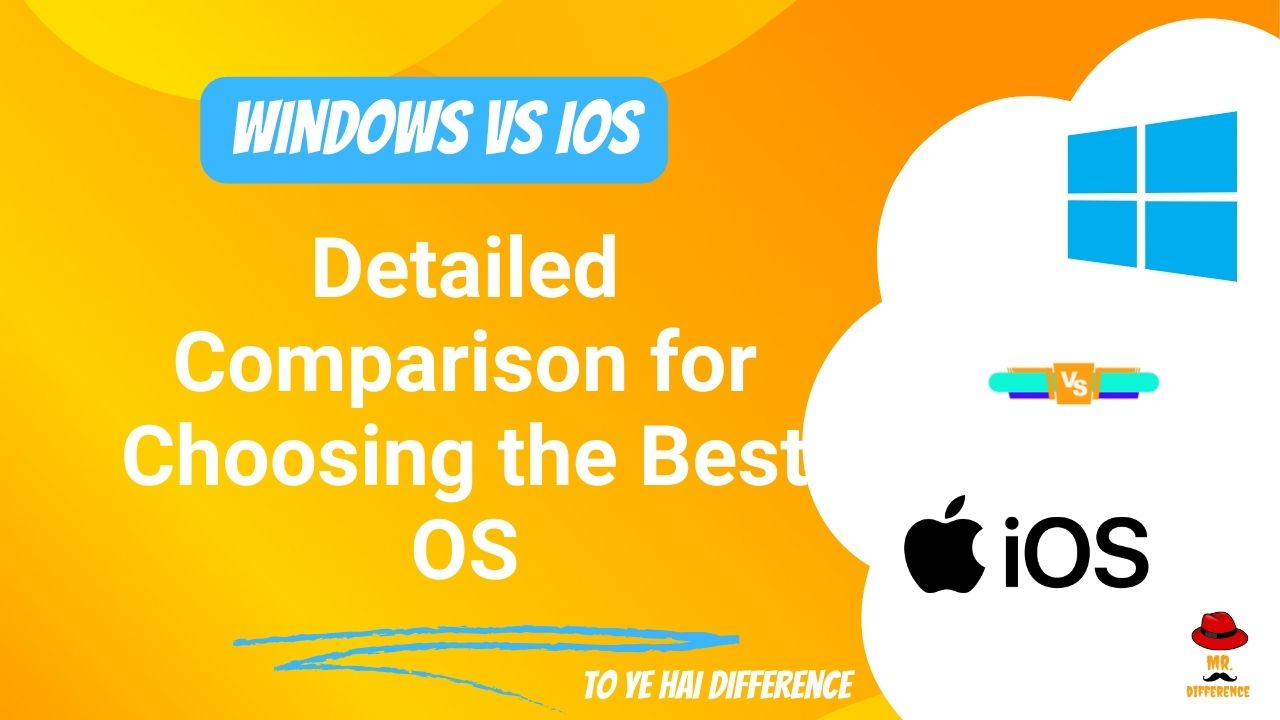In today’s digital age, choosing the right operating system is crucial, whether for personal or professional use. Two of the most popular operating systems are Windows and iOS, each offering unique features and benefits. But how do they stack up against each other? This article delves into the key differences between Windows and iOS, helping you make an informed decision.
What Are Windows and iOS?
Windows, developed by Microsoft, is one of the most widely used operating systems globally, powering a variety of devices from desktops to tablets. Known for its versatility and compatibility with a broad range of software, Windows is the go-to choice for many users.
On the other hand, iOS, developed by Apple, is the operating system that runs on the iPhone, iPad, and iPod Touch. iOS is known for its smooth user experience, tight security, and seamless integration with the Apple ecosystem.
Why Compare Windows and iOS?
Choosing between Windows and iOS can be challenging, especially since both operating systems offer robust features. The choice often boils down to what you need from your device. Whether it's for gaming, productivity, or security, understanding the differences can help you pick the best option for your needs.
User Interface Comparison
Windows vs iOS: User Interface
Windows User Interface
Windows offers a highly customizable user interface, with options to change themes, colors, and even the Start menu layout. The latest version, Windows 11, introduces a centered Start menu and a more streamlined design, making it visually appealing and user-friendly.
iOS User Interface
iOS, in contrast, is known for its clean, minimalist design. The interface is intuitive, with apps arranged on a home screen grid. The simplicity of iOS is one of its strengths, offering users a straightforward and consistent experience across all Apple devices.
Customization Options in Windows and iOS
Windows provides extensive customization options, from desktop backgrounds to system sounds. iOS, while more restrictive, offers some customization through widgets and the ability to rearrange apps. However, iOS’s customization is limited compared to Windows, reflecting Apple’s focus on a consistent user experience.
App Ecosystem
Windows and iOS App Ecosystem
Windows App Store vs Apple App Store
The Windows App Store, though improving, still lags behind the Apple App Store in terms of the number of apps available. The Apple App Store is renowned for its wide selection of high-quality apps, particularly in the areas of creativity and productivity.
Quality and Variety of Apps
While Windows offers a vast array of software, especially for business and productivity, iOS excels in mobile apps, with many developers releasing their apps first on iOS due to its lucrative market. This often means iOS users have access to the latest and most innovative apps before they are available on Windows.
App Compatibility and Updates
Windows apps are designed to run on a wide variety of hardware, making compatibility a key consideration. iOS apps, however, are optimized for Apple’s hardware, leading to better performance and stability. Additionally, iOS users benefit from regular updates that bring new features and security enhancements.
Security Features
Security: Windows vs iOS
Built-in Security Features in Windows
Windows has made significant strides in improving security, with features like Windows Defender, BitLocker, and Secure Boot. However, because Windows is the most widely used OS, it is also the most targeted by hackers, requiring users to be vigilant about security.
Built-in Security Features in iOS
iOS is often lauded for its security, with built-in features like Touch ID, Face ID, and regular security updates. Apple’s closed ecosystem and strict app store policies make iOS a secure choice, especially for users concerned about privacy.
Vulnerabilities and Threats
While both operating systems have vulnerabilities, Windows tends to be more susceptible to malware and ransomware attacks due to its widespread use. iOS, while not immune, is generally considered more secure because of Apple’s stringent controls and the limited number of devices running iOS.
How Users Can Enhance Security on Windows and iOS
For Windows users, installing reputable antivirus software, enabling firewalls, and keeping the system updated are essential for maintaining security. iOS users should ensure their devices are updated to the latest version and avoid downloading apps from untrusted sources.
Performance and Stability
Performance: Windows vs iOS
Speed and Responsiveness
Windows is known for its flexibility, but this can sometimes lead to performance issues, especially on lower-end hardware. iOS, designed specifically for Apple’s devices, typically offers better speed and responsiveness, thanks to its optimized software-hardware integration.
Stability and Crashes
Windows, due to its compatibility with various hardware and software configurations, can sometimes suffer from stability issues. iOS, with its controlled environment, is less prone to crashes and glitches, providing a smoother user experience.
Resource Management
Windows can be resource-intensive, particularly with background processes that can slow down performance. iOS, on the other hand, is more efficient in managing resources, which helps in maintaining battery life and overall performance.
Integration with Other Devices
Windows and iOS: Integration with Other Devices
Windows Integration with Other Microsoft Devices
Windows offers excellent integration with other Microsoft products like Xbox, Surface tablets, and even Android phones through the “Your Phone” app. This allows users to sync notifications, photos, and messages seamlessly.
iOS Integration with Apple Ecosystem
iOS shines when it comes to integration within the Apple ecosystem. Features like Handoff, AirDrop, and iCloud make it easy to work across devices, whether you’re moving from an iPhone to a MacBook or sharing files between an iPad and an iPhone.
Cross-Platform Compatibility
While iOS is tightly integrated within the Apple ecosystem, Windows offers broader compatibility with different hardware and software, making it a more versatile choice for users who don’t want to be locked into a single ecosystem.
Customization and Personalization
Customization Options in Windows vs iOS
Personalization Features in Windows
Windows allows users to deeply customize their experience, from desktop themes to taskbar settings. Users can also install third-party software to further personalize their system, making it truly their own.
Personalization Features in iOS
iOS offers more limited personalization options. While recent updates have introduced widgets and app organization features, the level of customization is still far behind Windows. However, the simplicity of iOS is seen as a benefit by those who prefer a straightforward user experience.
How Customization Impacts User Experience
The ability to customize Windows extensively can enhance productivity and satisfaction for power users, while iOS’s simplicity appeals to users who prefer a consistent, easy-to-use interface without the need for extensive tweaking.
Pros and Cons of Windows and iOS
| Feature | Windows | iOS |
|---|---|---|
| Customization | Extensive customization options | Limited customization for a consistent UI |
| Security | Vulnerable to malware but offers advanced tools | Highly secure with strict app store regulations |
| App Availability | Wide range of software, especially for desktops | Superior quality and variety of mobile apps |
| Performance | Can vary based on hardware | Optimized for speed and responsiveness |
| Integration | Broad compatibility with multiple devices | Seamless integration within Apple ecosystem |
| User Interface | Highly customizable | Simple, consistent, and easy to use |
| Stability | Can be prone to crashes | Generally stable and reliable |
Use Cases: When to Choose Windows vs iOS
Windows vs iOS: Best Use Cases
Who Should Use Windows?
Windows is ideal for users who need a versatile operating system for a wide range of tasks, from gaming to business applications. It’s also the preferred choice for those who require extensive customization or who work in environments where Windows-based software is the standard.
Who Should Use iOS?
iOS is perfect for users who are deeply integrated into the Apple ecosystem or who value a seamless, intuitive user experience. It’s also a great choice for those who prioritize security and access to high-quality mobile apps.
Industry-Specific Recommendations
- Creative Professionals: iOS, particularly on iPads, is favored for its robust creative apps and Apple Pencil support.
- Business Users: Windows offers extensive productivity software and is often the standard in corporate environments.
- Gamers: Windows is the preferred choice due to its support for a wide range of games and gaming hardware.
Frequently Asked Questions (FAQs)
Which OS is better for gaming, Windows or iOS?
Windows is generally better for gaming due to its support for a wide range of games, high-performance hardware, and compatibility with gaming peripherals. iOS is more limited, focusing on mobile gaming rather than high-end gaming experiences.
Can you switch from Windows to iOS easily?
Switching from Windows to iOS can be challenging if you are heavily invested in the Windows ecosystem. However, Apple offers tools like iCloud and data migration services to help make the transition smoother.
Which OS offers better app availability?
iOS offers a wider variety of high-quality mobile apps, particularly in areas like creativity and productivity. Windows, however, provides a broader range of desktop software, especially for professional and enterprise use.
How do Windows and iOS handle software updates?
Windows updates are released regularly but can sometimes cause compatibility issues. iOS updates are more streamlined, with all eligible devices receiving updates simultaneously, ensuring a more uniform user experience.
What are the differences in file management between Windows and iOS?
Windows offers a traditional file management system with folders, drives, and the ability to manage files directly. iOS, while more restrictive, uses a simplified file system focused on apps rather than traditional file management, which can be limiting for some users.
Which OS is more secure, Windows or iOS?
iOS is generally considered more secure due to its closed ecosystem and strict app store policies. Windows, while secure with proper precautions, is more vulnerable due to its openness and the sheer number of users, making it a frequent target for malware.
Is one OS better for business use than the other?
Windows is often the better choice for business use due to its widespread adoption in the corporate world, compatibility with enterprise software, and flexibility. iOS is also used in business, particularly in industries like design, but is more common in mobile applications.
Conclusion
Choosing between Windows and iOS ultimately depends on your specific needs and preferences. Windows offers flexibility, a wide range of software, and extensive customization, making it a versatile choice for various users. iOS, on the other hand, provides a smooth, secure, and integrated experience within the Apple ecosystem, appealing to those who value simplicity and high-quality apps.
If you have any thoughts or questions about Windows and iOS, feel free to leave a comment below. We’d love to hear from you and discuss your experiences with these operating systems!





Write a comment